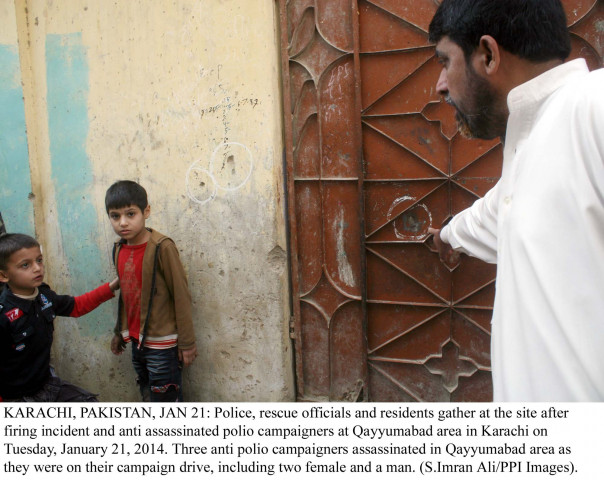Polio attacks
As result of attacks on anti-polio teams, several parts of country have not been covered in campaigns in recent years.

An official points to wards a bullet hole caused by the firing on polio workers in Karachi on Tuesday as two children look on. PHOTO: PPI
These were, unfortunately, not the first time that the anti-polio teams were attacked. In fact, the incident on January 21 was the eighth such attempt in Karachi alone.
Law enforcers have made some progress in catching the culprits, especially the ones in Karachi, but the progress has not been enough to prevent future attacks. The lack of faith in the police’s competence has forced health workers to openly blame the law enforcers for failing to provide adequate security. The colleagues of the victims of the January 21 attack in Karachi accused the police of not sending in personnel on time for the teams to start their campaign. On the other hand, the police insisted the teams ignored their requests and started working ahead of the schedule. In this blame-game, the men who carried out the attack were able to walk free.
The repercussions of such attacks are not only on crime levels in society but their consequences go much deeper than that. As a result of attacks on anti-polio teams, several parts of the country have not been covered in campaigns in recent years. Many children were deprived of this essential vaccination, due to which Pakistan has seen a significant rise in the number of polio cases.
According to Unicef, at least 91 cases were detected in Pakistan in 2013. Of these, around nine were reported in Sindh, seven in Punjab, 10 in K-P and 65 in Fata. At least four new polio cases have been confirmed within the first two weeks of 2014. Law-enforcement agencies must make efforts to apprehend those responsible so that no further attacks take place and Pakistan can finally eliminate polio.
Published in The Express Tribune, January 23rd, 2014.
Like Opinion & Editorial on Facebook, follow @ETOpEd on Twitter to receive all updates on all our daily pieces.















COMMENTS
Comments are moderated and generally will be posted if they are on-topic and not abusive.
For more information, please see our Comments FAQ